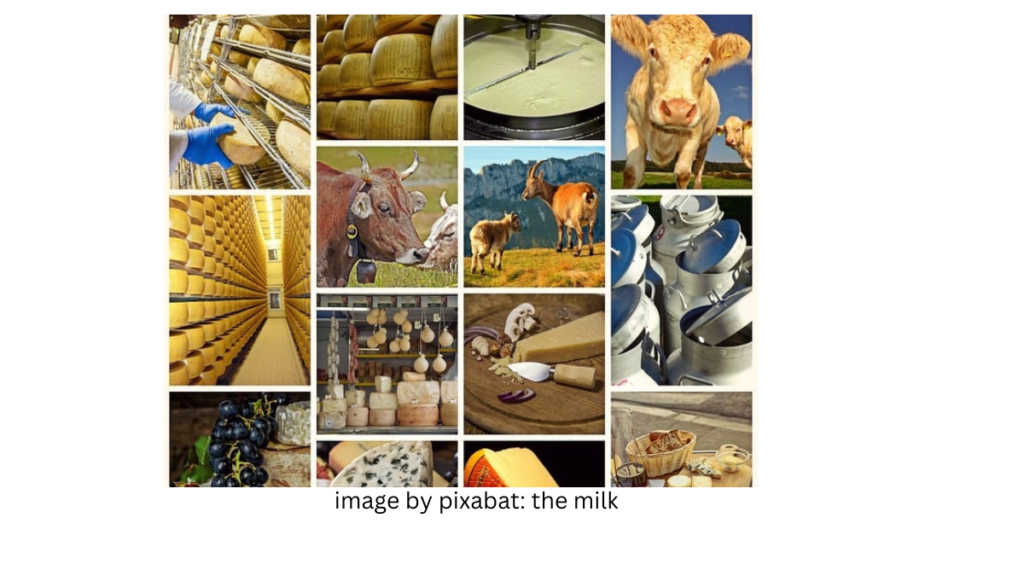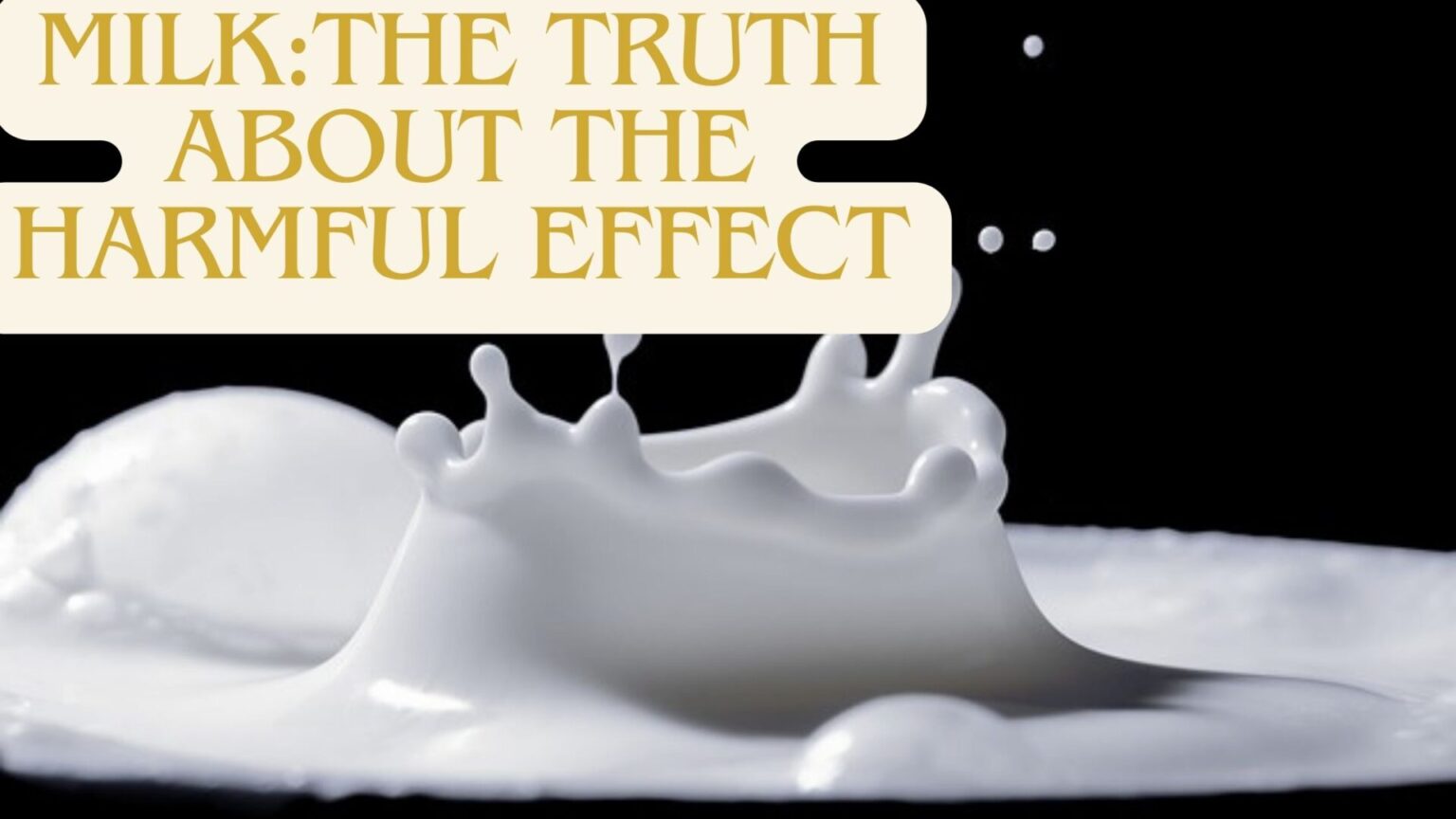Introduction:-
The Truth About the Harmful Effects of Milk: Is Milk Really as Healthy as We Think

Milk has long been touted as a health food, but recent research has called into question its benefits. In fact, there is a growing body of evidence that suggests that milk and dairy products can actually be harmful to human health.This article will explore the potential health risks of milk, including its high content of saturated fat, cholesterol, and casein, as well as its link to inflammation and cancer. It will also provide tips for replacing milk in your diet with healthier alternatives.
Is Milk Really Harmful to Humans?
The Harmful Effects of Milk
- High in saturated fat and cholesterol: Milk is a major source of saturated fat and cholesterol, both of which have been linked to an increased risk of heart disease, stroke, and other health problems.
- Contains casein: Casein is a protein found in milk that has been shown to promote inflammation in the body. Inflammation is a major underlying factor in many chronic diseases, including heart disease, cancer, and autoimmune disorders.
- Can cause digestive problems: Milk can cause digestive problems in some people, especially those who are lactose intolerant. Lactose intolerance is a condition that affects up to 65% of the world’s population. People with lactose intolerance are unable to digest the sugar lactose, which is found in milk. This can lead to symptoms such as bloating, gas, diarrhea, and nausea.
- Linked to cancer: There are some studies that have linked milk consumption to an increased risk of certain types of cancer, such as prostate cancer and breast cancer. However, more research is needed to confirm these findings.
Tips for Replacing Milk in Your Diet
- Use plant-based milks: There are many different plant-based milks available, such as soy milk, almond milk, and oat milk. These milks are a good source of calcium and other nutrients, and they are also lower in saturated fat and cholesterol than cow’s milk.
- Eat more leafy green vegetables: Leafy green vegetables are a good source of calcium, and they also contain other important nutrients, such as vitamin K and magnesium.
- Get your calcium from other sources: There are many other sources of calcium, such as fortified foods and supplements.
Does milk contain harmful chemicals?
Milk can contain harmful chemicals, but the amount of these chemicals varies depending on the source of the milk and the way it is processed. Some of the most common harmful chemicals found in milk include:
- Pesticides: Pesticides can be used to kill pests on crops that are used to feed dairy cows. These pesticides can then end up in the milk.
- Hormones: Hormones can be given to dairy cows to increase milk production. These hormones can then end up in the milk.
- Antibiotics: Antibiotics can be used to treat sick dairy cows. These antibiotics can then end up in the milk.
- Heavy metals: Heavy metals can be found in the environment and can end up in the milk of cows that graze on contaminated land.
The levels of these harmful chemicals in milk can vary depending on the source of the milk and the way it is processed. For example, organic milk is produced without the use of pesticides or hormones, so it is likely to have lower levels of these harmful chemicals.
If you are concerned about the levels of harmful chemicals in milk, you can choose to buy organic milk or milk that has been certified as free of pesticides, hormones, and antibiotics. You can also choose to drink plant-based milks, which do not contain any animal products.
It is important to note that the safety of milk is regulated by the Food and Drug Administration (FDA). The FDA sets limits on the amount of harmful chemicals that can be present in milk. However, it is still possible to consume harmful levels of these chemicals if you drink a lot of milk.
If you are concerned about the safety of milk, you should talk to your doctor. They can help you assess your individual risk and make recommendations about whether or not you should drink milk.
Is packet milk good for health?
Whether packet milk is good for health or not depends on a number of factors, including the source of the milk, the way it is processed, and your individual health needs.

In general, packet milk is a good source of calcium, protein, and other nutrients. However, it is important to note that packet milk is often processed using heat, which can destroy some of the nutrients in the milk. Additionally, some packet milks may contain added sugars or artificial flavors, which can be unhealthy.
If you are concerned about the healthfulness of packet milk, you can choose to buy organic milk or milk that has been certified as free of added sugars and artificial flavors. You can also choose to drink plant-based milks, which do not contain any animal products.
Here are some of the pros and cons of drinking packet milk:
Pros:
- Packet milk is a good source of calcium, protein, and other nutrients.
- It is convenient and easy to store.
- It is a good option for people who are lactose intolerant.
Cons:
- Packet milk may be processed using heat, which can destroy some of the nutrients in the milk.
- Some packet milks may contain added sugars or artificial flavors.
- It may be more expensive than other types of milk.
Ultimately, the decision of whether or not to drink packet milk is a personal one. You should weigh the pros and cons and decide what is best for you.
If you have any concerns about the healthfulness of packet milk, you should talk to your doctor. They can help you assess your individual risk and make recommendations about whether or not you should drink packet milk.
Which milk will be beneficial for us from the point of view of health?
The type of milk that is most beneficial for you depends on your individual needs and preferences. Here are some of the most popular types of milk and their health benefits:

- Cow’s milk: Cow’s milk is a good source of calcium, protein, and other nutrients. It is also a good source of vitamin D, which is important for bone health. However, cow’s milk can be high in saturated fat and cholesterol, which can be unhealthy for some people.
- Soy milk: Soy milk is a good alternative to cow’s milk for people who are lactose intolerant or who follow a vegan diet. It is a good source of calcium, protein, and other nutrients. Soy milk is also a good source of isoflavones, which have been shown to have some health benefits, such as reducing the risk of heart disease and cancer.
- Almond milk: Almond milk is a good source of calcium, vitamin E, and other nutrients. It is also a good source of fiber, which can help you feel full and satisfied. Almond milk is lower in calories and fat than cow’s milk, making it a good choice for people who are watching their weight.
- Oat milk: Oat milk is a good source of calcium, protein, and fiber. It is also a good source of beta-glucans, which have been shown to have some health benefits, such as lowering cholesterol levels. Oat milk is lower in calories and fat than cow’s milk, making it a good choice for people who are watching their weight.
- Cashew milk: Cashew milk is a good source of calcium, protein, and other nutrients. It is also a good source of magnesium, which is important for muscle and nerve function. Cashew milk is lower in calories and fat than cow’s milk, making it a good choice for people who are watching their weight.
Ultimately, the best type of milk for you is the one that you enjoy the most and that fits your individual needs and preferences. If you are unsure which type of milk is right for you, talk to your doctor or a registered dietitian.
Here are some additional factors to consider when choosing a type of milk:
- Lactose intolerance: If you are lactose intolerant, you will need to choose a type of milk that is lactose-free. Some lactose-free milks are made from cow’s milk, while others are made from plant-based milks.
- Allergies: If you have allergies to any animal products, you will need to choose a type of milk that is made from plants. There are many different plant-based milks available, so you should be able to find one that you enjoy.
- Taste: Ultimately, the best type of milk for you is the one that you enjoy the most. If you don’t like the taste of cow’s milk, you can try a different type of milk. There are many different types of milk available, so you should be able to find one that you like.
Conclusion
The evidence suggests that milk is not as healthy as we once thought. If you are concerned about the potential health risks of milk, you may want to consider reducing or eliminating it from your diet. There are many healthy alternatives available, so you won’t have to miss out on the nutrients you need.
FAQS
What evidence does the book/documentary present regarding the harmful effects of milk? The book/documentary presents a range of scientific studies, medical reports, and anecdotal evidence to support its claims about the harmful effects of milk consumption. This evidence may include data on lactose intolerance rates, correlations between dairy intake and certain health conditions, and discussions on the ethical implications of dairy farming.
Are there any opposing viewpoints presented in “Milk: The Truth About the Harmful Effect”? While the primary focus of the book/documentary is on highlighting the potential negative impacts of milk consumption, it may also address counterarguments or opposing viewpoints. These might include discussions on the nutritional benefits of milk, cultural perspectives on dairy consumption, or industry perspectives on dairy farming practices.
How can I determine if the information presented in “Milk: The Truth About the Harmful Effect” is reliable? It’s important to critically evaluate the sources cited in the book/documentary and consider the credentials of the author/creator. Additionally, consulting with healthcare professionals or nutritionists can provide further insights into the claims made in the book/documentary.







uqSsYAHlonmqzFViLPjvee
Your point of view caught my eye and was very interesting. Thanks. I have a question for you.